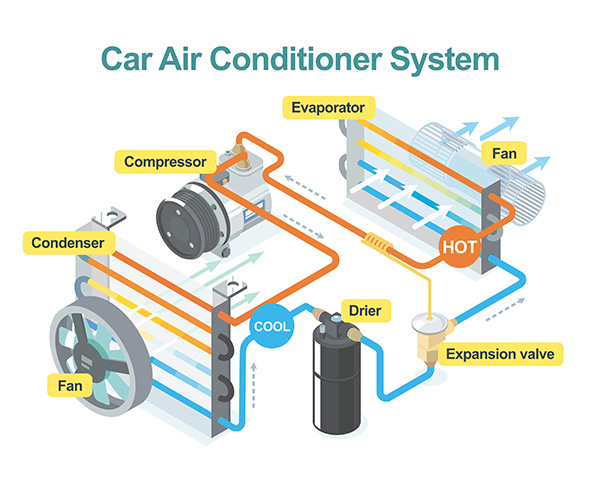
Have you ever wondered what keeps your car's air conditioning blowing crisp, cool air during those scorching summer days? The secret ingredient is Freon, a chemical compound essential to the function of A/C systems. Understanding Freon and its role in your vehicle's air conditioning can help you maintain a more comfortable and efficient driving experience. Let's dive into the world of Freon and explore its significance in A/C systems.
The Basics of Freon
Freon is a trade name for a group of chlorofluorocarbon (CFC) compounds used as refrigerants in air conditioning systems, including automotive A/C units. Developed by DuPont, Freon is renowned for its effectiveness in absorbing heat and providing cooling. The most common types of Freon used in automotive A/C systems are R-12 and R-134a. However, due to environmental concerns, R-12 has been largely phased out in favor of more eco-friendly alternatives like R-134a and R-1234yf.
But what exactly does Freon do in your A/C system? It circulates through the system, absorbing heat from the interior of your car and releasing it outside, thus keeping the cabin cool. This process involves compression and expansion of the refrigerant, a cycle that repeats continuously to maintain a comfortable temperature.
How Does Freon Work in A/C Systems?
The functionality of Freon in an A/C system revolves around its thermodynamic properties. Here's a simplified breakdown of how it works:
- Compression: The A/C compressor compresses the Freon gas, raising its pressure and temperature.
- Condensation: The high-pressure, high-temperature gas moves to the condenser, where it dissipates heat and condenses into a high-pressure liquid.
- Expansion: The high-pressure liquid then travels to the expansion valve or orifice tube, rapidly expanding and cooling down, turning into a low-pressure liquid.
- Evaporation: This low-pressure liquid flows into the evaporator coil inside the vehicle, absorbing heat from the cabin air and evaporating into a low-pressure gas.
- Recirculation: The now warm low-pressure gas returns to the compressor, and the cycle repeats.
This continuous cycle efficiently removes heat from your car's interior, ensuring a steady flow of cool air.
Why Is Freon Important for Your Car's A/C?
Freon is the lifeblood of your car's air conditioning system. Without it, the system cannot function, and you'll be left sweating through the summer months. Here are some key reasons why Freon is crucial:
- Efficient Cooling: Freon's unique properties make it an excellent refrigerant, capable of absorbing and releasing heat efficiently.
- System Protection: Proper levels of Freon help prevent the compressor from overheating and potentially failing, which can be a costly repair.
- Comfort and Safety: A functioning A/C system not only keeps you comfortable but also helps maintain driver alertness and safety by preventing heat-related fatigue.
Environmental Impact and the Shift to New Refrigerants
Historically, Freon (specifically R-12) contributed to ozone layer depletion, leading to international regulatory changes such as the Montreal Protocol. This prompted the automotive industry to switch to more environmentally friendly refrigerants like R-134a and, more recently, R-1234yf. These newer refrigerants have lower global warming potential (GWP) and are less harmful to the environment.
R-1234yf, for instance, has a GWP of just 4 compared to R-134a's GWP of 1,430. This significant reduction in environmental impact has made R-1234yf the preferred choice for modern automotive A/C systems.
Signs Your Car Might Be Low on Freon
Wondering if your car's A/C system is low on Freon? Here are some telltale signs to watch out for:
- Reduced Cooling: If the air from your vents isn't as cold as it used to be, it could indicate low Freon levels.
- Frequent Cycling: The A/C system cycles on and off more frequently than normal.
- Unusual Noises: Hissing or bubbling sounds might suggest a refrigerant leak.
- Visible Leaks: You might notice oily residue around A/C components, indicating a Freon leak.
If you experience any of these symptoms, it's important to have your A/C system checked by a professional.
To keep your car's A/C system in top shape, follow these maintenance tips:
- Regular Check-ups: Have your A/C system inspected annually to ensure it's working efficiently and the refrigerant levels are adequate.
- Prompt Repairs: Address any leaks or malfunctions immediately to prevent further damage.
- Clean Components: Keep the condenser and evaporator clean to ensure efficient heat exchange.
- Use A/C Year-Round: Run your A/C periodically during the winter to maintain the lubrication of seals and components.
Beat the heat with a perfectly functioning A/C system! Schedule your A/C maintenance at Willy's Transmission & Air Conditioning today and enjoy a comfortable drive.